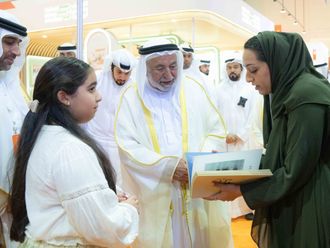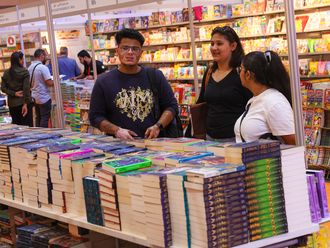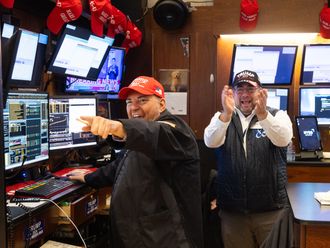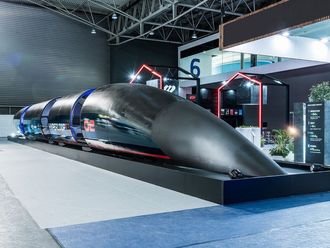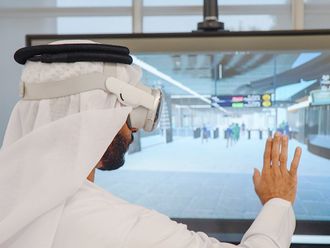Strong family and willpower have enabled Dubai resident Sujit Sukumaran defeat cerebral palsy
His is an inspiring story of exceptional courage, of triumph over the most difficult challenges. It is also an outstanding example of what a human being can achieve if he has the determination to succeed and the support of devoted parents, dedicated doctors and helpful teachers and friends.
Sujit Sukumaran weighed just one kilogram at birth. Oxygen deficiency after birth resulted in cerebral palsy, leaving him with several physical disabilities. He started crawling when he was 18 months old. He took his first steps, on crutches, when he was four and was unable to walk without support till the age of 12.
He has known the discomfort of daily physiotherapy since he was nine months old and he has spent every school vacation in hospital undergoing medical treatment.
Not only did he have to overcome physical challenges but he also had to deal with the pain of losing his father at the tender age of 15. Yet, today the young man of 17 strides confidently towards a bright future, free from physical or emotional crutches.
"I prefer to count my blessings. Most cerebral palsy patients have some amount of brain damage, but I am lucky that my brain is in pristine condition," says Sujit.
Life has forced him to grow up quickly but he speaks about his struggle without the slightest trace of self-consciousness or self-pity, and a lot of humour. And a struggle it has indeed been.
Sujit's tryst with physiotherapy began at nine months. "The stretching and bending was extremely painful and I remember that I always went in crying, kicking and shouting all the way. But four years later I was able to stand with the help of callipers. Today I am very grateful to the physiotherapists at Al Wasl and Rashid Hospitals," he acknowledges.
Sujit's main sources of strength were his mother Ramani and his father E. N. Sukumaran. "God gives special children to special parents and whatever I am today, I owe to it my parents," he says. He was particularly close to his father. "Dad was my friend, guide and mentor. He was a self-made man with a very positive outlook. He always pushed me to aim for the impossible and taught me that problems only exist because we create them," reminisces Sujit.
His nursery school teachers recommended that he be sent to a regular school. Sujit did well in the entrance exam of The Indian High School, Dubai, and despite initial reservations, the school agreed to admit him.
"The happiest day of my life was the first day I went to a regular school. With my callipers on and holding the hands of both my parents I walked shakily into school, but this was my first step into a normal life," states Sujit emphatically.
He strongly feels that regular schools should be open to admitting students like him. "A special needs child can never be pushed to improve in a special school environment however good it may be. Whatever I am today is largely due to what Indian High School was able to do for me," he insists.
A helper carried Sujit and his bag from the school bus to his class everyday and his teachers were always encouraging.
"A major milestone for me was when in the fifth standard a friend suggested that he would carry my bag instead of the helper and others followed suit. I am fortunate to have such friends who do these things for me with love," says Sujit, adding with a smile that the front seat in the bus was always reserved for him.
Being in a regular school also had its share of problems and disappointments. Children stared at him all the time. "When I asked dad why they did that, he would explain that people stare at anything that is different. They will stare at Aishwarya Rai also if they see her at close quarters, he would say. And eventually it was their curiosity to know which strange planet I came from that helped me to make friends with them," he laughs.
Sujit felt particularly miserable when the class went out to play. "I sat on my bench and watched them running around and felt really angry. I would pray that someday I could join them and luckily for me, even though it took 15 years, that prayer has been answered," he says happily.
His most disappointing experience was his first school picnic to Mushrif Park. "Dad had given me money and told me to try all the rides, but the teachers were too scared to let me go on them. So I just sat on the grass and watched the others," he recalls sadly. But Sujit immediately brightens up at the memory of his parents taking him back the same evening to all the rides in the same park. "And recently I went to Wild Wadi with my class and enjoyed the 80 foot Jumeirah Sceirah, one of the scariest rides in the park," he says beaming with pride.
Big strides
While he made big strides academically and socially at school, his medical treatment continued. Every morning before school he went for two-hour physiotherapy sessions and there was some surgery scheduled during every vacation.
The first operation, at the age of eight, was a dorsal rhizotomy performed in Hyderabad, India, to treat his spasticity. In a five-and-a-half-hour operation, the doctors opened his back and cut off a series of nerve fibres from the spinal cord. "This was my first experience with big time pain. The physiotherapy was just a trailer while this was the movie," he jokes.
For 15 days he lay in hospital on his stomach and had to stay in bed for two months. He could not sit and any movement was painful. "The anticipation of a better future, prayer and my ability to make friends with doctors, nurses and other patients is what kept me going," recalls Sujit.
He finds a positive side even in this traumatic experience. "The doctor gave me a set of books called the 'children's knowledge bank'. This is what got me interested in reading and in quizzing. And though I still had to wear calf splints, after this surgery I could walk better and the spasticity reduced considerably," he reflects.
His 11th birthday was again spent in hospital. This time it was to loosen his hamstrings. "Instead of cake, I got some chloroform. Both my legs were in plaster for two months and the itching felt like there was a swarm of ants in there," describes Sujit.
As usual he had read up everything he could about the surgery and even watched part of it under local anesthesia. The physiotherapy after the prolonged immobility was extremely painful once again.
"There is no gain without pain," he says nonchalantly. "At least now I had total freedom of muscular movement. I could touch my feet and tie my own shoe laces, though I still had to wear support pads to protect the muscles," says Sujit with typical optimism. He has yet another scar from a tendon lengthening operation done during yet another vacation.
Around this time Sujit took part in a poetry recitation contest. "The cruel remarks of some boys triggered the desire to prove myself on stage. The confidence I gained led to participation in quiz contests and other such competitions," he admits. He remembers with pride his first stage experience as a compere at a variety show organised by the Al Wasl Ladies Club for special needs children and their parents.
An important milestone w
An inspiring story
His is an inspiring story of exceptional courage, of triumph over the most difficult challenges. It is also an outstanding example of what a human being can achieve if he has the determination to succeed and the support of devoted parents, dedicated doctors and helpful teachers and friends.



